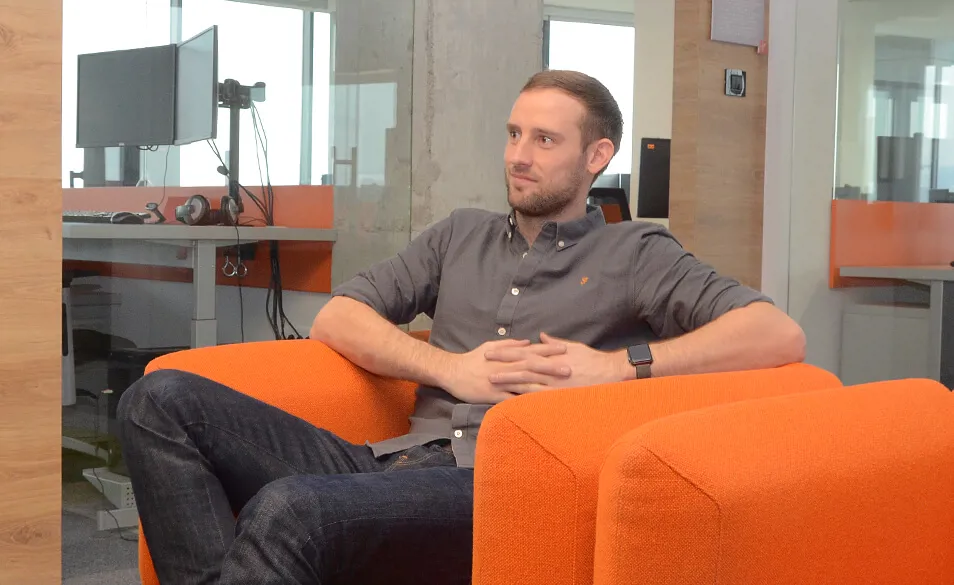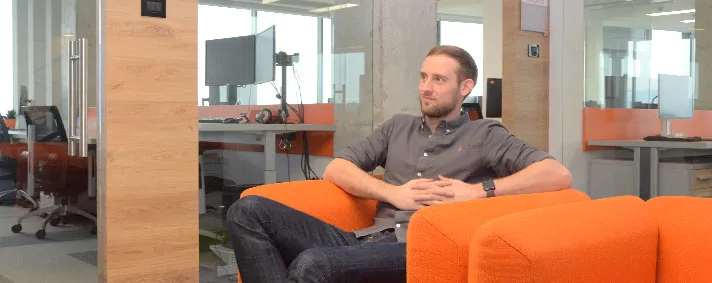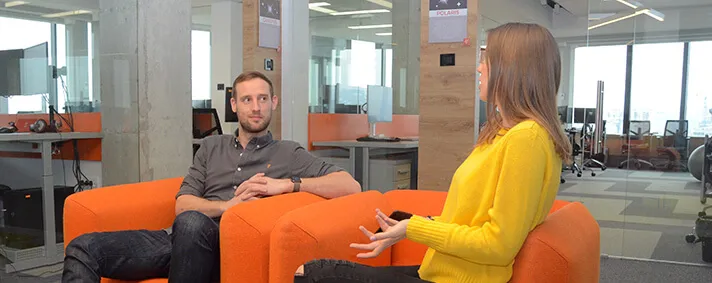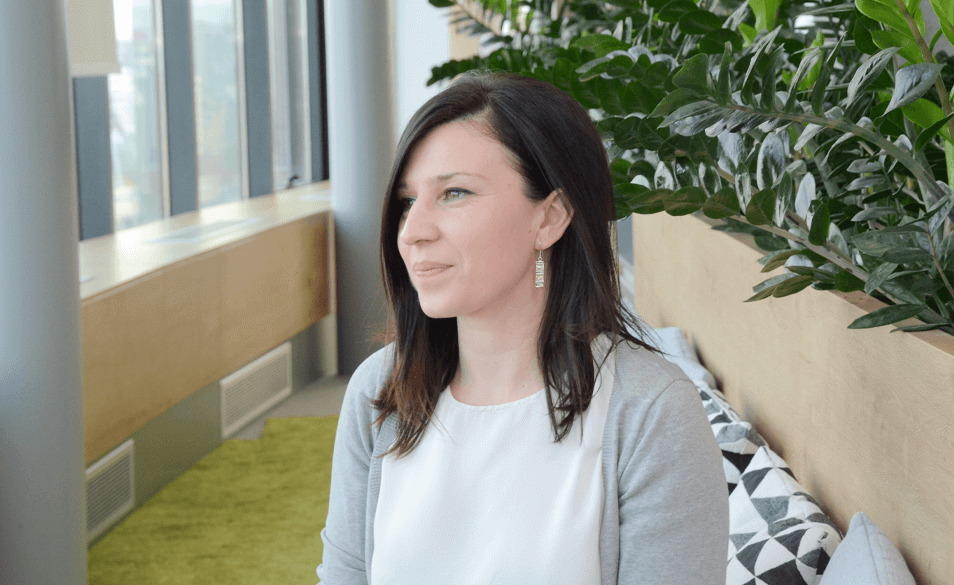A fresh voice: An interview with Harry Roberts

Table of contents
A while ago we organized a workshop with Harry Roberts, and it was a great success. Harry’s amazing energy and enthusiasm made us fall in love with front-end development again. Somewhere between the two sessions of the workshop, I grabbed a chance to interview Harry and he was gracious enough to offer us a glimpse into his work as a front-end developer.
M: First, I want to thank you for taking some time to answer a few questions about your life and experience.
H: My pleasure!
M: Ok, this is not the first time you've been to Novi Sad, right? We know that a few years ago you attended DaFED, a non-profit organization which we have been supporting from its very beginning.

An interview with Harry Roberts
H: This is my second time. I was at DaFED three and a half years ago, and as soon as I got the email asking me to come back to Novi Sad, I was like, ‘yes’‘, immediately, ‘yes’.That first time was in 2014, and I can honestly say I had the best time ever.
M: What is the first thing that comes to your mind when you think of Novi Sad?
H: The first thing that comes to my mind when I think about Novi Sad and Serbia in general is ‘friends’. I made some amazing friends here last time, so, for me, it’s friends and the people. The first time I was here, I left feeling very humbled. Everyone here is really friendly. A lot of people want to look after you here in Novi Sad. Even at the airport when I got on the flight yesterday. Whereas on a other flights, they are look at you like “who are you?”. But, on Air Serbia, the steward was saying: “Welcome aboard! Is there anything we can do to make your flight more comfortable?” And then I just thought to myself ‘Yep, I’m going back to Serbia—this is the hospitality I remember!’
M: Recently, it was a six year anniversary of your first ever conference. Can you tell me what things have changed since your first conference? What are the lessons learned?
H: Well, at my first talk, I was terrified. When I was in school, we had those group projects where you had to present the finished project to the class. I was always the kid who made a deal that I would do all the work if you didn't ask me to be the speaker. So, when I was first asked to do the conference, I really didn't want to do it. But when I did it, it wasn't as bad as I had expected. But, it took me a long time to say “yes” to the second conference and the third one. So, for me, what has changed is that I got more comfortable in front of people, big groups and small groups. Now, I can speak to strangers which is really important ‘cus I am going to meet strangers all the time. In terms of the experience and in terms of actual skills, it has been very important and informative thing. There are more and more conferences appearing all the time, and I get exposed to lots of interesting new things frequently. So, yeah, that has been the main change I guess. I am no longer nervous before the talk, but six years ago I was so nervous I couldn't eat for days before the talk.
M: How did you deal with it?
H: I just had to, I guess. I didn't really have an option. In fact, the last time I spoke at DaFED I was terrified because: 1. There was such a big crowd 2. I was the only speaker. There's a lot of stress and a lot of pressure on you there because it’s not like there are several speakers. But, then, you learn that everyone in the audience is on your side, and when you see everyone smiling back at you and being friendly, you think: “This is fine, actually”.
M: In one interview I read that you are a huge proponent of BEM (Block Element Modifier). So, how big is the impact of BEM on CSS developers?

A fresh voice - Harry Roberts
H: It has been enormous. BEM arrived several years ago and, now, it became a really wide-spread option. What’s cool is that every site where you view source, you can see some BEM naming. So, the impact has been enormous for something so simple. Also, what's really good about it is that you don't really have to completely change the way you work. It’s easy and quick to adopt, and, I think, it has trained developers to think more not only about componentizing their architecture, but also more about how they structure their CSS. What's interesting now is that we are kind of in that post-BEM era, when people are starting to use newer tools like CSS and JS (which is a completely separate discussion).
M: Do you think that it might trigger a revolution in CSS development?
H: I think it already has. I think it has reached critical mass and I think people looked at BEM and thought: “This is almost perfect componentization and the right way how we can take the step further”. Actually, I think that the second revolution is happening right now because we are moving away from BEM and starting using things like CSS in JavaScript.
M: Whether we like it or not, all of us belong to the digital age. We always choose to make our lives easier and we choose to use a shortcut - most things we do on a daily basis depending on the Internet. So, my question to you is - how do you think the digital age will evolve in the future? What’s the future of the Internet?
H: Yeah, you are completely right. It is fascinating because the Web happened so quickly and suddenly, it's everywhere. I think the next stage will be more about the Internet of things, like invisible user interfaces. We are used to using web apps or mobile apps or iOS apps for a lot of things. But, I think that the Internet of things is gonna’ get way more important because it will bring bigger challenges and raise some ethical issues, like, what we should do with the data. I’ve got an Amazon Echo in the corner of my living room and I’m pretty certain that they are listening to every word I say. For example, if I mention a particular brand, the next day I get adverts for that brand. It’s creepy. So, the next thing we need to be aware of is that we are going to start using more IOT services and we gonna’ have smart homes. For example, look at the way you manage the building you work in. That's not necessarily the Internet of things, but, I think, that’s the next step in tackling digital.
M: Ok, do you consider it to be a good or a bad thing?
H: It depends. In a way, it's really bad because it makes people really, really lazy - like being able to control your lights from your mobile or just by clapping. But, I also think it will be solving some more important problems. I am being a bit of a hippie there, I guess, but I do think that developers could be doing a more meaningful work, like, finding better solutions to improve a public transport system.
M: Now, that you are here in Vega IT, can you tell me what’s your impression of our company, our team and the entire workshop organization?
H: I had a wonderful time, mainly because the teams are all so friendly and welcoming. This is something I’ve noticed on both of my trips to Novi Sad: people are wonderful! I was instantly made to feel very welcome, which made it feel more like I was spending two days with friends. This also allowed us to have a very relaxed and informal time together. Vega IT seems like such an exciting place to work! Beautiful offices, loads of great staff, a very successful business, and a really great company culture (a lot of places fail on this last point), meaning that Vega IT seems like a place where people want to work. I’m also very aware of how highly-regarded Vega IT is in the local IT community, which is really cool!
M: Can you tell us a bit more about the level of knowledge that was needed to attend the workshop in the first place, as well as the preparedness and the willingness of our colleagues to participate in it?
H: The level of knowledge was open to a broad spectrum of background and experiences; you could see that a lot of the more senior developers really engaged with the more technical aspects, but there was still something for everyone. In the hack-day on day two, it was so great to see just how much people had learned and implemented. It made me very proud to see just how much they had all achieved in only a short space of time. People came into work on their weekend! I think that tells you a lot about their willingness and enthusiasm. During the days, people asked questions and were engaged.They really all did such a great job!
M: Which conference would you recommend to everyone who’s involved in front-end development?
H: DaFED - one of my favourites! But, if it's specifically from the front-end field (CSS, HTML, CSS developers who want to learn technical things), one of my favourite front-end conferences is Front-trends conference in Warsaw - a really good conference. There’s also Fronteers conference in Amsterdam. It’s quite technical, and it has some very intelligent speakers.These are the ones that I would recommend, especially, if you want to learn technological things. But, if you are a front-end developer or designer who wants to see some talks and also get inspired, you need to visit my favourite conference ever in the world called Beyond Tellerrand. It’s held in Germany in Munich, Berlin and Düsseldorf. It's a really great mix of technical and non-technical talks. When I go there, I am usually a technical speaker. But, there are also artists, illustrators and typographers, so you can really get chance to learn something different and also get very inspired.
M: How do you see the Web and its complexity in the next five years?
H: Wow, even in the next five years, it’s really hard to comment, because, right now, the Web is way more complex than it has ever been. So, as an individual, it’s really hard to choose the right techniques. I think things might get worse, but I would also like to see things get more standardized to make the Web simpler again.The Web is being asked to do tasks that are more complex than we could have ever imagined. When the Internet was invented, it was a case of “here is a simple static website of five pages”. But, now, we've got really complex applications. Complexity is a kind of understandable. So, I'm hoping it will get better, and that the industry will mature and start to standardize the things we are doing.
M: Is there anyone from front-end development world that inspires you, and that you still haven’t had the chance to meet, but would like to meet in the future?
H: I am the luckiest guy alive. I get to meet most people. I’ve met nearly everyone that I would have liked to, and the good news is that everyone is lovely. There are a couple of people I haven't met yet, and I would really like to. One of them is a guy named Patrick Meenan. Currently at Google, WebPage test is his body of work. I have never met him, but he seems like a really good dude. I couldn't do my job without the tools he built for free, so he is someone I really admire and respect. If I met him, I would just probably buy him a beer and say thank you. That would be nice.
M: Thank you!


